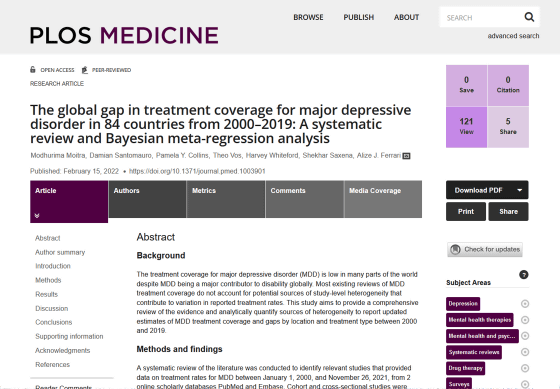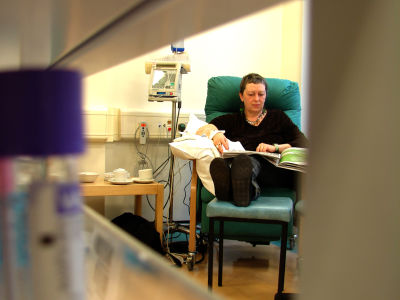Studies show that the majority of people with depression do not even receive the minimum necessary treatment

The global gap in treatment coverage for major depressive disorder in 84 countries from 2000–2019: A systematic review and Bayesian meta-regression analysis
https://journals.plos.org/plosmedicine/article?id=10.1371/journal.pmed.1003901

The majority of people globally with major depressive disorder aren't getting treatment --Scimex
https://www.scimex.org/newsfeed/the-majority-of-people-globally-with-major-depressive-disorder-arent-getting-treatment
Vast Majority of People With Depression Aren't Getting Treatment, Global Review Finds
https://www.sciencealert.com/worldwide-review-finds-most-people-with-depression-aren-t-getting-treatment
Depression has long been a serious health problem worldwide, but the pandemic of the new coronavirus infection (COVID-19) has spurred an increase in mental illnesses such as depression. However, although there are treatments for depression such as psychological interventions and drug therapies, there are also inadequate care systems and public trends, and not all people are treated well.
So the research team meta-analyzed 149 studies on depression treatment published between 2000 and 2021 to find out how well people with depression are receiving treatment. The series of studies was conducted in 84 countries and the data collection period is 2000-2019. Data such as subject age, gender, and quality of treatment were included.
As a result of the analysis, it was found that the treatment rate of depression is low worldwide, and it became clear that the economic disparity between countries is linked to the treatment disparity of depression. Depressed patients used mental health services at 33% in high-income countries and 8% in low- and middle-income countries, the researchers said. He added that 23% of high-income countries and only 3% of low- and middle-income countries receive what is considered the minimum care needed to treat depression.

However, the research team declines that there are regional gaps in the data used in this meta-analysis. Much of the data used in this study came from high-income countries such as North America and Western Europe, while data from low- and middle-income countries such as sub-Saharan Africa and South Asia account for only 22%. It was said that. Although the data used in the analysis can be said to be biased in this way, the research team said, 'The treatment rate for depression is low worldwide, but the treatment rate in low- and middle-income countries may be particularly serious.' Insist.
Alize Ferrari, an epidemiologist at the
Science Alert, a scientific media outlet, said, 'Health problems are preferentially allocated to infectious diseases such as malaria, AIDS and tuberculosis, and less than 2% are allocated to mental illnesses such as depression. He pointed out that the world should put in place a system to provide effective treatment for depression. 'If we can effectively treat depression, we can extend our overall healthy life expectancy by 43 million years between 2016 and 2030,' he said, referring to a 2016 study .

Related Posts:
in Science, Posted by log1h_ik







